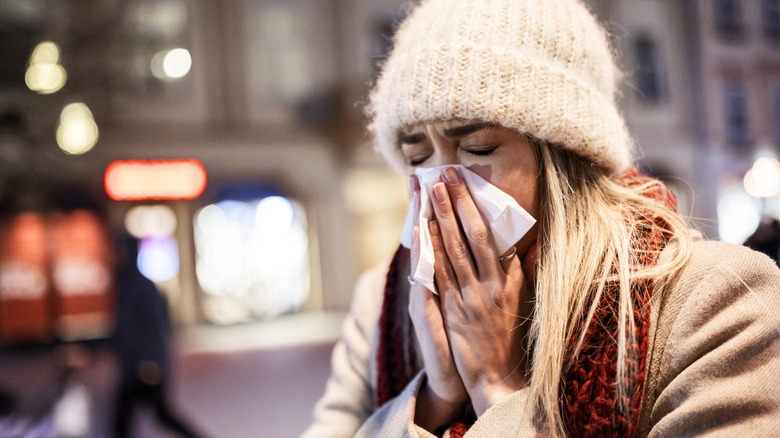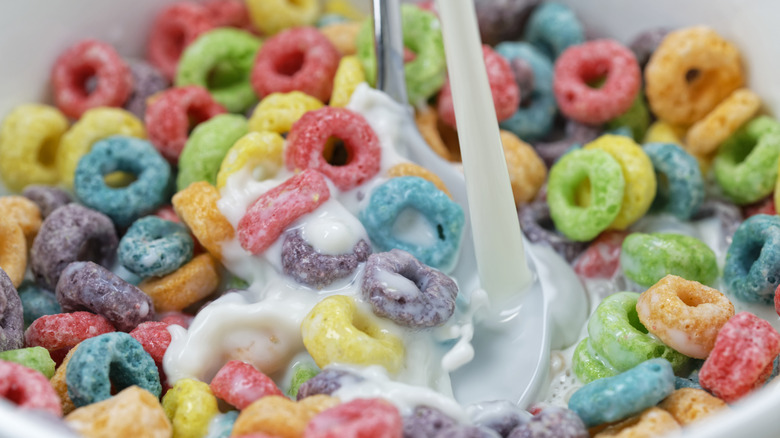We may receive a commission on purchases made from links.

Nastasic/Getty Images
The winter months require you to bundle up during the most frigid temperatures, and your blood vessels constrict in your nose, mouth, and throat to keep your body temperature warm. That can put some stress on your immune system because those white blood cells have a harder time getting to those viruses that invade your upper respiratory tract. Not only that, but being bundled up covers your skin so your body can’t absorb the vitamin D needed for your immune system.
Before you head out in the morning, your body needs enough vitamins and minerals from a healthy breakfast to help with your immune function. While a “good” breakfast might mean a bowl of oatmeal topped with berries and walnuts, you could also turn to that “bad” breakfast food that many health-obsessed people eschew: boxed cereal.
Sure, those Froot Loops you ate as a kid don’t actually have fruit, but many breakfast cereals are fortified with vitamins and minerals to support your immune system. These days, you can find healthier breakfast cereals that have protein, fiber, and low added sugar. Let’s look at a few popular breakfast cereals to see how they measure up in nutrients.
Immune-supporting vitamins and minerals in some breakfast cereals

Photo By Cathy Scola/Getty Images
Your immune system works best when you get enough vitamins A, B6, B12, B9 (folate), C, D, E, and K, according to the National Institutes of Health. You’ll also need minerals like iron, copper, selenium, magnesium, and zinc. Kellogg’s Froot Loops are good sources of B, C, and D vitamins as well as iron and zinc, but you’re missing vitamins A and E and important minerals. Remember, though, that Froot Loops cereal also has 12 grams of added sugar and artificial dyes such as red 40, yellow 5 and 6, and blue 1.
A different option for kids might be Post’s Honey Bunches of Oats, which provides a healthy amount of your daily recommended vitamin A and several B vitamins. Even though you won’t get much vitamin D and zero vitamin C, this cereal has plenty of immune-supporting minerals, including copper, zinc, magnesium, and iron.
A healthier option for breakfast in terms of immune support is Quaker’s Oatmeal Squares. One cup gives you iron, zinc, magnesium, and copper while also nourishing your body with vitamins A, E, a little bit of C, and most of your B vitamins. This cereal doesn’t have vitamin B12 or vitamin D, but pouring a cup of low-fat milk over your cereal will supply you with more B vitamins, including B12, and about 15% of your daily vitamin D. This cereal also has more than 4 grams of fiber and 6 grams of protein, which is another healthy consideration in your breakfast cereal.
Breakfast cereals should have some fiber and protein

Jose Luis Pelaez/Getty Images
Breakfast cereals are known for their convenience. You can even find those small boxes of them at your favorite convenience store. In addition to those vitamins and minerals to support your immune system, a “good breakfast” cereal should have at least 5 grams of protein, 3 grams of fiber, and low added sugar (per Eating Well).
Ever tried Alpen Muesli? Part of Post’s consumer brand, Alpen is a blend of whole grains, raisins, almonds, and hazelnuts. A serving of Alpen Muesli has 7 grams of fiber, 8 grams of protein, and no added sugar. Your immune system will love the good source of iron, magnesium, zinc, copper, and selenium in this cereal. You won’t find a ton of vitamins in muesli aside from vitamin B6, thiamin, and riboflavin. However, you also don’t get the highly processed ingredients that many breakfast cereals are known for.
You might pass the Malt-O-Meal brand in the cereal aisle because these cereals are sold in bags rather than boxes. Malt-O-Meal has Frosted Mini Spooners cereal that has a pretty impressive nutritional profile. A cup of this cereal has almost a full day’s supply of iron plus a good dose of magnesium, zinc, copper, and selenium. You’ll also get plenty of B vitamins, and the 6 grams of fiber and 5 grams of protein mean that this cereal won’t have as much of an impact on your blood sugar.
Credit: healthdigest.com










